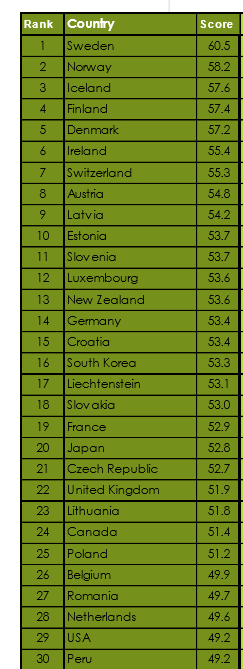The 6th edition of the Global Sustainable Competitiveness Index (GSCI) is dominated by Northern European nations with the top 5 spots taken by the Scandinavian nations, topped by Sweden. Of the largest economies, Germany is ranked 14th, Japan 20th, the UK 22st, the Netherlands 28th, the US 29th, and China 32nd.
The Global Sustainable Competitiveness Index is based on 111 quantitative performance indicators to ensure total objectivity. All data is derived from renowned sources (the World Bank, various UN databases). All data sets are scored for the latest available data as well as the development over the last 10 years. The 111 indicators are grouped in the 5 areas of the sustainable competitiveness model:
- Natural Capital: the given natural environment, (availability of resources, depletion of resources)
- Social Capital: health, security, freedom, equality and life satisfaction
- Resource Management: resource efficiency and intensity
- Intellectual Capital: education, innovation, value-adding industry
- Governance Efficiency:infrastructure, market and employment structure, financial industry
The GSCI is based on an inclusive model of competitiveness, looking at the fundamentals that allow a nation-economy to thrive. Contrary to conventional evaluation of “competitiveness” that are based on financial and/or economic figures, the GSCI evaluates the root cause of economic development and success.
The GSCI is based on the sustainable competitiveness model calculated through 111 measurable, quantitative indicators to exclude all subjectivity. Performance data is also analysed against the trends over time to reflect not only the present, but also the outlook into the future. A comprehensive measurement for competitiveness. Sustainable competitiveness.
Key takeaways from the 6th edition of the Sustainable Competiveness Ranking 2017:
- Of the top twenty nations only three are not European – New Zealand on 13, South Korea on 16, and Japan on 20.
- Scandinavia covers the top 5 ranks. Sweden is leading the Sustainable Competitiveness for a second consecutive year – followed by the other 4 the Scandinavian nations.
- The top 20 are dominated by Northern European countries, including the Baltic states and Slovenia
- Germany ranks 14, the UK 22, and the World’s largest economy, the US, is ranked 29. The US ranks particularly low in resource efficiency, but also social capital – undermining the global status of the US in the future
- Of the large emerging economies (BRICs), China is ranked 32, Brazil 42, Russia 43, and India 121.
- Some of the least developed nations have a considerable higher GSCI ranking than their GDP would suggest (e.g. Laos, Timor, Burma, Bhutan, Suriname…)
- Asian nations (South Korea, Japan, Singapore, and China) lead the Intellectual Capital ranking. However, achieving sustained prosperity in these countries might be compromised by Natural Capital constraints and current high resource intensity/low resource efficiency
- The Social Cohesion ranking is headed by Northern European (Scandinavian) countries, indicating that Social Cohesion is the result of economic growth combined with social consensus
- The US is set for decline, in particular vs. China, if policies proposed under the new administration are to be fully implemented
- Conventional sovereign bond ratings do not reflect the full risk and potential associated with nation economies. They need to integrate sustainability, now.





